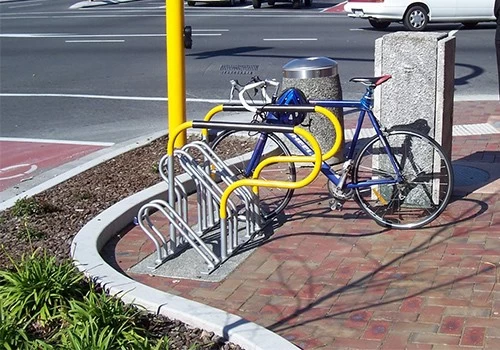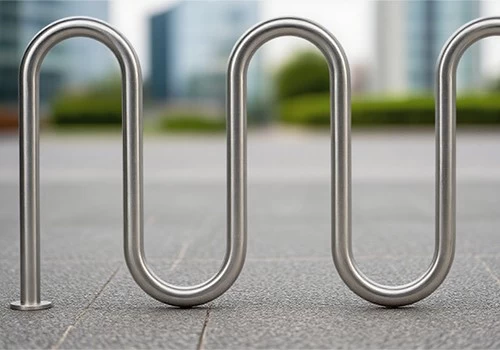Specifications
Model Number : PV-SC-001
Type: Bike parking and storage
Color:Yellow,Black,Green,Red,or Customized.
Style : both indoors and outside
Material : carbon steel
Loading: According to customer need
Size :195*23.2*75cm,200.55*23.2*75cm,or Customized.
Finish: hot-galvanized
Specifications
Model Number : PV-0081-01
Type: Bike parking and storage
Color:silver
Style : both indoors and outside
Material : carbon steel
Loading: According to customer need
Size :Height 1463mm, Depth 1114mm
Finish: hot-galvanized
Model Number : PV-0081-01
Type: Bike parking and storage
Color:Black
Style : both indoors and outside
Material : carbon steel
Loading: 2-10 bikes (According to customer need)
Size :Height 1463mm, Depth 1114mm
Finish: hot-galvanized
Model No.: PV-H1
Size: w605*D400*H330mm
Specification: Round tube:¢16*1.2mm
Finish: Power coated
Net Weight: 1.6 kgs
Packing size:6pcs/ctn
MOQ: 100pcs
Model Number : PV-0024-01
Material : carbon steel/stainless steel
Loading: according customer space size,we can design according the size
Size : W1977*D1130(depend on your parking space)*H2500mm
Finish: Powder coated ,hot-galvanized/electric polish
Packing size :2000*2000*2500mm(40 parking space )
Powder coated ,hot-galvanized/electric polish
Product number:PV-0046-01
Material:carbon steel
Specification:10.2*59*28CM or Customized.
MOQ:100PCS
Port:Shanghai
Trademark:PV
Model Number : PV-0081-01
Type: Outdoor Bike Parking Rack
Style : both indoors and outside
Material : carbon steel
Loading: 2-10 bikes (According to customer need)
Size :170.5*116*148CM
Finish: hot-galvanized
Model Number : PV-0055-01
Type: compact flat pack /slot
Color:black / silver /yellow/optional
Style :Outdoor/indoor
Material : carbon steel/ stainless steel
Capacity : park 6 bikes
Size : L1400*W1054*H840mm
Net weight :38KG
Finish: powder coating / hot galvanized /elctropolishing
Packing size :1490*860*160mm 1pcs/ctn
Product Name: Multi-Capacity Horizontal Two Tier Bike Parking Rack
Material: Carbon Steel
Finish: Powder coated
Post: 80mm * 80mm thickness: 3mm
Steel plate: thickness: 2mm
Dimension: 1325*1890*1830mm
Weight: 370 kg/set
Model: PV-0067-01
Material: stainless steel 304
Pipe: 50 mm* 2.5 mm
Size: 900*700 mm(L*W)
Surface treatment: polishing

In the world of urban mobility and sustainable transportation, bicycle racks play a crucial role. They are not just simple structures for parking bikes; they are an essential part of urban infrastructure. The durability of bicycle racks is of utmost importance, as they are exposed to various environmental conditions, from harsh sunlight and rain to the wear and tear caused by frequent use. One of the key factors determining the longevity of bicycle racks is the material they are made of. In this blog post, we will explore the different materials used in bicycle racks and why they matter for long-term use.
Stainless Steel
Stainless steel is a popular choice for bicycle racks, especially in areas with high humidity or near coastal regions. It contains a significant amount of chromium, which forms a passive chromium oxide barrier on the surface when present in a high - enough concentration. This barrier makes the steel highly resistant to staining and rust.
For example, the 316 series austenitic stainless steel, often used in high - end bicycle racks, has a particularly high content of chromium and nickel. This composition provides enhanced resistance to corrosion. The Duo - Gard Parkland Bike Racks, constructed from 316L stainless steel, are a great illustration. They are suitable for high - density parking areas and can withstand weathering, vandalism, and other elements that outdoor bicycle racks endure. In fact, in a 10 - year period, 316L stainless steel lasts significantly longer than the more commonly used 304 stainless material, resulting in greater cost savings in the long run.
Stainless steel bike racks are not only corrosion - resistant but also very strong. They can easily support the weight of multiple bicycles without bending or breaking. However, one drawback of stainless steel is its relatively high cost. But considering its long lifespan and low maintenance requirements, the initial investment can be well worth it for both public and private installations.
Carbon Steel
Carbon steel, especially low - carbon steel, is another common material for bicycle racks. Standard steel products are fabricated using high - quality, low - carbon steel which contains only trace amounts of carbon. This allows for high ductile strength. Steel is an incredibly strong material that is used in various heavy - duty applications such as buildings, bridges, and industrial machine parts.
When used for bicycle racks, carbon steel is often combined with a protective powder coating. This coating not only adds an extra layer of protection against rust and corrosion but also comes in different colors, allowing for customization to match the surrounding environment. For instance, some urban bike racks are powder - coated in bright, eye - catching colors to make them more visible and appealing. The drawback of carbon steel is that if the protective coating gets scratched or damaged, the steel is prone to rusting. Regular inspection and maintenance are required to ensure the integrity of the coating and prevent corrosion.
Galvanized Steel
Galvanized steel is carbon steel that has been coated with a layer of zinc. This process, known as galvanization, provides excellent corrosion resistance. The zinc coating acts as a sacrificial anode, meaning that it will corrode before the steel underneath, protecting the underlying metal. Galvanized bicycle racks are a cost - effective option, as they offer good durability at a relatively lower price compared to stainless steel.
The steel is first hot - dipped in a bath of molten zinc, which creates a thick, adherent coating. This coating is highly resistant to the elements and can withstand outdoor conditions for many years. However, like carbon steel, if the zinc coating is severely damaged, the underlying steel can start to rust. But overall, galvanized steel is a reliable choice for bicycle racks in areas where the budget is a concern but still requires a durable solution.

Plastic and Polymer Materials: Lightweight and Corrosion - Free
Low - Density Polyethylene (LDPE)
Low - density polyethylene is a durable thermoplastic polymer that has gained popularity in the manufacturing of bicycle racks. It has a high resistance to cracking under stress and excellent impact properties. LDPE racks are also known for retaining their shape and color for many years, making them an ideal material for long - term bike parking.
One of the main advantages of LDPE is its light weight. This makes the racks easy to install and relocate if needed. They are also non - corrosive, which means they are perfect for use in areas with high humidity or where they may come into contact with water. Additionally, LDPE racks are often more affordable than their metal counterparts. However, they may not be as strong as metal racks and may have a lower weight capacity. They are best suited for areas with light to moderate bike traffic.
Other Polymer Composites
There are also other polymer composites being used in bicycle rack manufacturing. These composites are often a combination of different polymers and additives to enhance specific properties. For example, some composites are designed to be even more rigid than LDPE, increasing their weight - bearing capacity. They can also be engineered to have better UV resistance, which is important for outdoor applications. Polymer composite racks are generally low - maintenance, as they do not rust or corrode. They also come in a variety of colors and finishes, allowing for a more aesthetically pleasing design. However, like LDPE, they may not be as strong as metal racks in extremely heavy - duty applications.
Comparing Material Performance
When choosing the right material for a bicycle rack, several factors need to be considered. Durability, cost, maintenance requirements, and aesthetic appeal all play a role.
Durability
In terms of pure durability, stainless steel is at the top of the list. Its corrosion - resistant properties make it ideal for long - term outdoor use, especially in challenging environments. Carbon steel, when properly coated, can also be very durable but requires more maintenance. Galvanized steel offers good durability at a lower cost. Plastic materials like LDPE and polymer composites are durable in their own right but may not be as strong as metal. Wood, while aesthetically pleasing, is the least durable in harsh outdoor conditions without proper treatment.
Cost
Cost is a significant factor, especially for large - scale installations. Plastic and polymer - based racks are often the most affordable, followed by carbon steel and galvanized steel. Stainless steel racks are generally more expensive due to the cost of the raw material. Wooden racks can vary in cost depending on the type of wood used, but they may also require more maintenance costs over time.
Maintenance
Stainless steel bike racks require the least maintenance, as they are highly resistant to rust and corrosion. Plastic and polymer racks are also low - maintenance, as they do not rust. Carbon steel and galvanized steel racks need regular inspection and touch - ups of the protective coating to prevent rust. Wooden racks require the most maintenance, including treating for moisture, insects, and repainting or resealing periodically.
Aesthetic Appeal
Wooden racks offer a unique, natural aesthetic that can enhance the look of certain environments. Stainless steel has a sleek, modern appearance. Carbon steel and galvanized steel can be powder - coated in various colors to match the surroundings. Plastic and polymer racks can also be designed with different colors and finishes to be visually appealing.

Conclusion
In conclusion, the choice of material for bicycle racks depends on a variety of factors. For long - lasting, low - maintenance solutions in harsh environments, stainless steel is an excellent choice. If cost is a major concern and durability can be compromised slightly, carbon steel or galvanized steel with proper coatings can be used. Plastic and polymer materials are great for lightweight, corrosion - free, and budget - friendly options. Wooden racks, while requiring more maintenance, can add a special touch to certain settings. By understanding the properties and performance of different materials, bicycle rack manufacturers, urban planners, and property owners can make informed decisions to ensure that the bicycle racks they install are not only functional but also long - lasting and visually appealing.